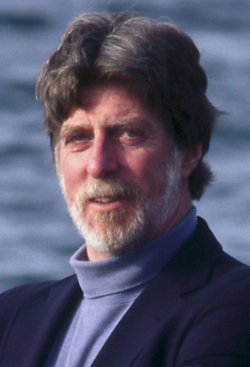2010 HPC Day >> Keynote Speaker
5th Annual HPC Day at Lehigh : Keynote Address

Dr.
John R. Delaney
Professor of Oceanography and holds the Jerome M. Paros Endowed Chair in
Sensor Networks at the University of Washington
1:10pm-2:15pm Sinclair Auditorium
Abstract: Driven by solar and internal geothermal energy, the complex processes interacting within the global ocean constitute the "flywheel" of our planetary life-support system; it is the massive volume of the ocean that drives long-term weather and short-term climatic variations across the seas and onto the continents. Entirely new approaches to understanding the complexity, power, and vagaries of this oceanic modulator are arising from the rapid implementation and use of submarine cabled networks that will provide unprecedented electrical power and bandwidth to thousands of increasingly sophisticated robot-sensor systems distributed throughout full-ocean environments. Partly triggered by the advent of a growing number of these cabled research systems, oceanographers are benefiting from a host of emergent technologies largely driven by communities external to the world of ocean sciences. Important developments include: robotics, biotechnology, cloud computing, in situ chemical and genomic sensors, digital imaging, nanotechnology, serious gaming, new visualization technologies, computational simulations and data assimilation, seismo-acoustic tomography, and universal access to the Internet. Far more powerful than any one of these emerging technologies will be the convergence of the ensemble. As these rapidly evolving capabilities are integrated into sophisticated, remote, interactive operations, a pervasive human telepresence throughout entire volumes of our, once "inaccessible", global ocean will be realized. Such capabilities will be required to meet the onset of immense environmental and societal challenges in the coming decades that can only be addressed through optimally informed international collaboration.with large data sets and multi-institutional collaborative research.
John Delaney is Professor of Oceanography and holds the Jerome M. Paros Endowed Chair in Sensor Networks at the University of Washington. Since 1997, he has directed development of the regional cabled ocean observatory in the northeast Pacific Ocean that evolved into the Regional Scale Nodes program within the National Science Foundation's Ocean Observatories Initiative. The construction phase of this observatory began in September 2009 with the announcement of an award to the University of Washington of $126 million over five-and-a-half years.
This distributed, remote, sensor-robotic network will convert a sector of the Juan de Fuca tectonic plate and overlying ocean into an internationally accessible, interactive, real-time natural laboratory capable of reaching millions of users via the Internet. Such networks are at the leading edge of ocean and earth science research and education.
Delaney, who joined the University of Washington faculty in 1977, has published nearly 100 papers scientific papers and articles, and has served as chief scientist on more than 45 oceanographic research cruises, many of which have included the Deep Submergence Vehicle Alvin and the Remotely Operated Vehicle Jason. In September 2005, he co-led the VISIONS'05 research expedition, which successfully broadcast the first-ever live, high-definition video from the seafloor across the world. Scientists, educators, and the general public, viewed the real-time broadcasts from the underwater volcanoes of the NE Pacific over cable and satellite television and on the web via the ResearchChannel.
His research focuses on the deep-sea volcanic activity of the Juan de Fuca Ridge in the northeast Pacific Ocean. In the summer of 1998, Delaney led a joint expedition with the American Museum of Natural History to successfully recover four volcanic sulfide structures now on display in AMNH's Hall of the Planet Earth. This U.S./Canadian effort was the subject of a NOVA/PBS and a BBC documentary entitled Volcanoes of the Deep. Samples collected on this expedition produced the highest temperature microbes ever cultured on earth. Some hypotheses link these deepsea volcanic systems to the origin of life on earth.
In 1987, Delaney served as the first Chairman of the RIDGE Program and initial co-chairman of the international InterRIDGE. Both programs were designed to foster intensive studies of the physical, chemical, and biological interactions that characterize the vigorous volcanic and hydrothermal activity along the 70,000-kilometer mid-ocean ridge system. These programs, still active today, have channeled hundreds of millions of dollars into research and education about processes that support exotic life forms sustained through chemosynthesis driven by plate tectonics several kilometers below sea level. Delaney has served on several NASA Committees charged with defining the nature of missions to Europa, one of the moons of Jupiter, suspected to harbor both a liquid ocean and submarine volcanoes.